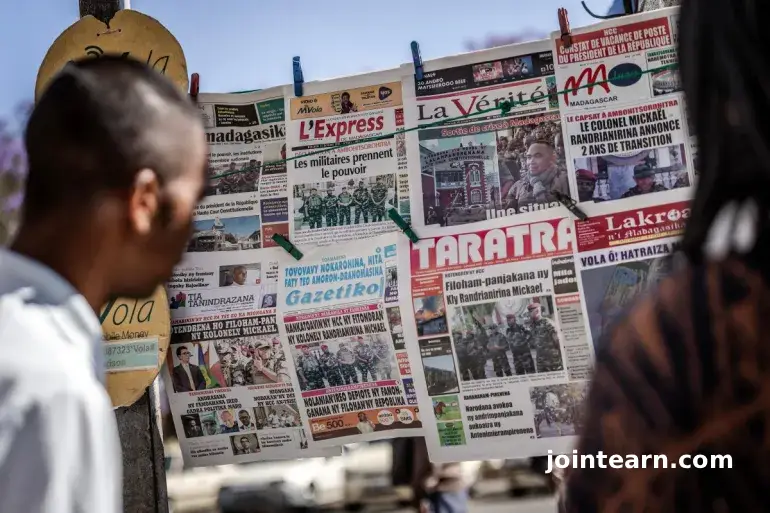
Antananarivo, Madagascar – October 16, 2025:
Madagascar’s political crisis deepened this week after the nation’s new military leader, Colonel Michael Randrianirina, announced he will be sworn in as president on Friday, defying international condemnation and the African Union’s suspension of the country’s membership following last week’s coup.
The announcement marks a turning point in Madagascar’s turbulent politics, coming just days after the military ousted President Andry Rajoelina, who fled the island nation amid violent protests and what he described as “credible threats to his life.”
Randrianirina to Be Sworn In Despite African Union’s Suspension
According to a statement released late Wednesday, Colonel Michael Randrianirina will take the oath of office before the High Constitutional Court, under the official title “President for the Refoundation of the Republic of Madagascar.”
“Colonel Michael Randrianirina will be sworn in during a formal hearing before the High Constitutional Court,” the military-led administration said in its announcement.
The move defies the African Union’s decision earlier in the day to suspend Madagascar’s membership “with immediate effect,” citing the unconstitutional seizure of power. The AU Peace and Security Council also demanded a swift return to civilian rule and the organization of democratic elections within a reasonable timeframe.
Political analysts warn that Madagascar’s new leadership could face growing isolation, as suspension from the 55-member bloc often leads to aid freezes, trade restrictions, and diplomatic pressure from African and international partners.
Former President Rajoelina Confirms Departure, Cites Threats
Ousted president Andry Rajoelina, who first came to power through a coup in 2009 and was re-elected in 2018, confirmed in a statement to Agence France-Presse (AFP) that he had left Madagascar between October 11 and 12, citing “explicit and extremely serious threats against the Head of State.”
Rajoelina reportedly escaped aboard a French military plane on Sunday amid chaos in the capital, Antananarivo, where weeks of anti-government demonstrations escalated into deadly clashes between protesters and security forces.
By Monday, he said he had taken refuge in a “safe location,” without disclosing his whereabouts. Since then, Rajoelina has made no public indication that he intends to return to the country.
Popular Uprising and “Gen-Z” Protests Sparked the Military Takeover
The military coup followed weeks of mass protests, initially sparked by power outages, water shortages, and allegations of government corruption. The demonstrations—dubbed “Gen-Z protests” due to the high youth participation—soon evolved into nationwide anti-government rallies demanding Rajoelina’s resignation.
Colonel Randrianirina, then a senior commander in the elite CAPSAT (Corps des personnels et des services administratifs et techniques) army unit, announced the seizure of power last week after publicly urging soldiers not to open fire on demonstrators.
He accused Rajoelina’s administration of “failing to meet the basic needs of the Malagasy people” and “losing all legitimacy.”
Military Dissolves Government Institutions, Promises Two-Year Transition
Following the coup, Randrianirina declared the dissolution of all state institutions, except the National Assembly, and announced that a military-led committee would govern the country for up to two years before organizing new elections.
He pledged that the transitional authority would focus on restoring order, fighting corruption, and rebuilding infrastructure, especially in energy and water sectors that had triggered the unrest.
Despite these promises, human rights organizations have warned of potential civil liberties violations under military rule, while international donors have urged Madagascar to return to constitutional order.
Madagascar Joins List of African States Under Military Control
Madagascar is now the latest former French colony to fall under military leadership since 2020 — joining Mali, Burkina Faso, Niger, Guinea, and Gabon, all of which have experienced military coups in recent years.
This wave of takeovers has raised concern across the African Union and the international community, as experts fear democratic backsliding and regional instability spreading across sub-Saharan Africa.
Political observers note that public disillusionment with weak civilian governments, corruption, and economic inequality has fueled these military uprisings, with many citizens initially supporting the armed forces as agents of change.
AU and International Community Demand Civilian Rule
The African Union, joined by the United Nations, European Union, and France, has condemned Madagascar’s coup and urged the junta to restore democratic governance.
AU Chairperson Moussa Faki Mahamat emphasized that “only a return to constitutional order can guarantee peace and stability in Madagascar.”
The UN Secretary-General echoed the sentiment, warning that prolonged military rule could further undermine investor confidence and delay international aid, which Madagascar heavily relies on for development and humanitarian support.
A Nation at a Crossroads
As Colonel Randrianirina prepares to be formally sworn in as president, Madagascar faces an uncertain political future. With international isolation looming and domestic divisions deepening, the country’s stability hinges on whether the new military leadership can deliver reforms without suppressing dissent or prolonging authoritarian control.
For now, the people of Madagascar — weary from decades of political upheaval — are left to watch and wait, hoping that the promise of reform does not become another chapter in their nation’s long cycle of crisis and transition.


Leave a Reply